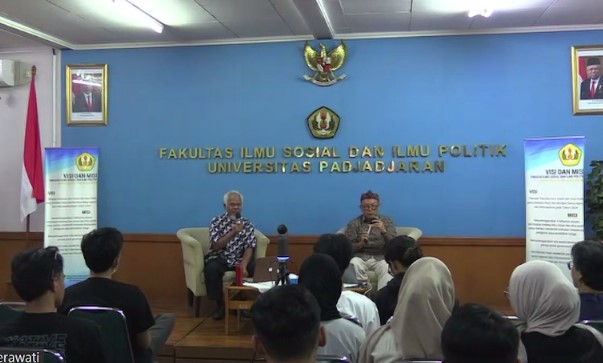
The cooperation between the Department of Anthropology, Faculty of Arts, UGM and the Department of Anthropology, FISIP, Universitas Padjadjaran resulted in several collaborative works, one of which is a visiting lecture at the campus. On May 14, 2024, Prof. Dr. Bambang Hudayana, M.A. was asked to teach at Padjadjaran University in the S1 Community Development and S2 Applied Anthropology classes. The lecture was held openly with the theme of the event “Rural and Agrarian Issues and Problems” moderated by Prof. Dr. H. Opan Suhendi Suwartaoradja, M.Si.
On that occasion, Prof. Dr. Bambang Hudayana, M.A. gave a lecture with the material “Participatory Action Research as the Power of Empowerment Anthropology”. He began with the history of the development of anthropology in Indonesia which was present starting as the leading anthropology of development (modernization agenda) where anthropologists were asked to succeed various programs with the role of mapping the potential and socio-cultural barriers to find solutions to these various problems. The development programs that involve the role of anthropologists include transmigration, green revolution, family planning, resettlement of alienated tribes, rural community development and so on. However, development anthropology has been criticized, giving rise to empowerment anthropology where participatory action research is used as a method of community empowerment or often called participatory action research (PAR). The advantages of using PAR are seeing problems that are more micro, detailed, emic descriptive, reflective, critical and more impartial. In addition, it can be used as material for the preparation of local scale development programs, advocacy, and education for the community.
Related to this, Prof. Bambang Hudayana shared the experience of research and community service in BUMDES Karangrejek, Gunung Kidul, which previously always experienced drought during the dry season. Then in 1998 the youth of the region initiated the construction of underground river water wells with the collaboration of UGM KKN students. The construction of the well was successful, even surplus water and sold outside the village to build several business units (village mart) and savings and loans from the profits managed by BUMDES.
In addition to this story, best practice was also shared on the Empowerment of Giriloyo batik artisans in Imogiri who were victims of the 2006 tectonic disaster. The PAR identified victim profiles, needs, funding schemes and forms of participation of affected communities. Prof. Dr. Bambang Hudayana, M.A. also shared PAR promoting cassava for food sovereignty in Indonesia which uses a local asset based approach; access based approach; people centered development. Not only that, Prof. Dr. Bambang Hudayana, M.A. also shared the tradition of PRA in other countries. In the lecture, students seemed enthusiastic by asking various questions.
[Public Relation Faculty of Cultural Science, Author: Dewi W, Editor: Sandya Kirani]

